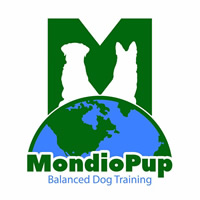Don't Become Your Puppy's Littermate
By Adrienne Mesko
So you've got a new puppy, and you want to do the absolute best job you can raising him and making sure he is safe, happy and fulfilled. You've poured over tons of articles on the web to help you pick the right puppy, consulted with your veterinarian, started looking up training strategies on the internet, and feel confident that you've got this. You know you are a great dog owner, and you are going to put in the work to get this right. If that's you, I'd ask you to consider this little seed of wisdom that I want to pass along to you today. Don't make the mistake of becoming your puppy's littermate. This is where all problems begin, even if you are unable to see them while your puppy is still small. What do I mean about not becoming your puppy's littermate? I will explain below.
Puppies usually start off their lives with their litter and their dam. As puppies grow, it is a perfectly normal and natural for many varieties of aggression to occur within the group in what looks like totally normal and even playful behaviors. While all of these experiences are critical for puppies development, it is very important that you don't become a part of a continuation of the behaviors into adulthood.
Need Training in the Hudson Valley Region? Give Us a Call! | (845) 235-4963
The vast majority of problems that occur with dogs and humans living together is the sharing of resources, and how that leads to a dog's misunderstanding of where his boundaries lie. In attempt to make puppies feel safe and loved, we give everything to them, except for the leadership they need at their young age. We allow them to bite our hands and legs, brushing these behaviors off as teething. We allow them access to our entire home, let them sleep in our beds, ply them with an endless array of treats and toys for “good behavior” though we aren't effectively marking and rewarding those behaviors. We get down on the floor and play rough with them in an attempt to bond, we fret over their every feeling and strive to fulfill their every desire. While our intentions are truly good ones, the outcome is often disastrous. In a worst case scenario, an unhinged dog is created. More mild outcomes are seen in puppies that develop with lower self confidence levels due to lack of structure and direction. We are so desperate to make absolutely sure that our dogs are head over heels in love with us that we provide them with everything they could ever want in hopes it will seal an eternal bond between dog and owner. The truth is that it often does the opposite. As the saying goes, 'don't make the mistake of treating your dog like a human, for he will treat you like a dog.'
If what you long for is a deep and lasting connection with your dog, present yourself as a leader to your dog. Use caution when sharing resources, as resources should be firmly established as yours, shared as a privilege. Dog and puppies are far more resilient than we give them credit for. They also crave the leadership that you can and should provide for them. Use common sense and stay committed to respecting your dog always. Bullying your dog, sticking your fingers in his bowl while he is eating, or exerting your dominance over your puppy is a quick way to lose their respect for you. Instead, teach appropriate behaviors on a leash or long line so they are crystal clear to your dog, and over time, you can fade out the leash. Use rewards, but don't bribe your dog. Use a mark and reward system with variable rewards. (See article about using marker training) Think about how you use praise. If you give it away all day long, it's value will diminish in short time. If you think about how you are using it, and give praise for good behaviors, you'll find that's your praise retains its value, and you have a convenient, natural way to motivate to your puppy.
It's important to start with a structured, leadership based approach to raising your puppy. When or if behavior issues crop up, you will have established a common language that will make addressing these issues far less complicated. In the pendulum of your relationship with your dog, on one side you have trust, and on the other side you have respect. If you have all trust and no respect, you are out of balance. If you have all respect and no trust, you are similarly out of balance. Strive to find a balance somewhere in the middle. Dog training is much more than training a dog to do obedience behaviors, it is about establishing expectations and responsibilities for both your dog and your relationship together.
Structured playtime is a fantastic way to bond with your puppy. Adding few rules and guidelines to playtime creates structure, and puts you in a leadership position with your puppy. So play, but do not play with your puppy as a member of his litter would.

